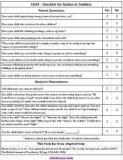Signs of Autism in Infants and Babies

Learn how to identify early signs of autism in infants and toddlers. It can be hard to detect behavior characteristics under the age of one, but finding them early improves chances of recovery. It is also difficult to say whether it is truly autistic disorder or something else at such a young age, but starting treatment immediately will only help your child regardless of a diagnosis.
Another important thing to do is attempt to rule out other causes of symptoms in infants to be sure all treatments possible are being done. Some of these may include food allergies, a sensory disorder, a seizure disorder or hearing impairment.
Petit Mal seizures can occur hundreds of times per day without a parent’s knowledge and can cause a child to have strange behavior, be frequently disoriented or appear as if in his/her own world. These disorders can also often coexist with signs of autism in infants.
Signs of Autism in Babies
If you feel that your child has any of the symptoms listed, talk with your pediatrician as soon as possible. Early signs of autism in infants include:
• Failure to make eye contact
• Problems with infant sleeping due to poor self-regulation.
• Behavior problems - frequent crying, hitting, or biting.
• Lack of smiles or other joyful facial expressions by 6 months of age
• Rigid behavior - always needing everything to be the exact same or child gets very upset.
• Failure to imitate facial expressions, sounds, or smiles by 9 months of age
• Failure to respond when his or her name is called by 12 months of age
• No babbling or baby talk by 12 months of age
• Failure to react to loud noises, by looking in the direction of the noise.
• Doesn’t follow objects with eyes
• Often stares at ceiling fans or shadows on wall while appearing unaware of surroundings
• Doesn’t reach out to be picked up, show objects, point, or wave by 12 months of age.
• Appears to be in a world of their own
• No spoken words by 16 months of age.
• No meaningful two word phrases that are spontaneous and not imitative.
Treatment for Signs of Autism in Infants
Although treatment for infants can be more limited, there are things that could mean the difference between your child having severe delays and merely symptoms of mild autism.
This may involve getting help with; infant sleep problems, behavior problems, sensory defensiveness, and/or receiving Applied Behavior Analysis - ABA autism therapy. Developmental therapists, speech therapists or child behavior specialists could also greatly help to reduce signs in infants.
References
1. Autism Symptoms and Early Signs. www.helpguide.org. 10-15-10.
